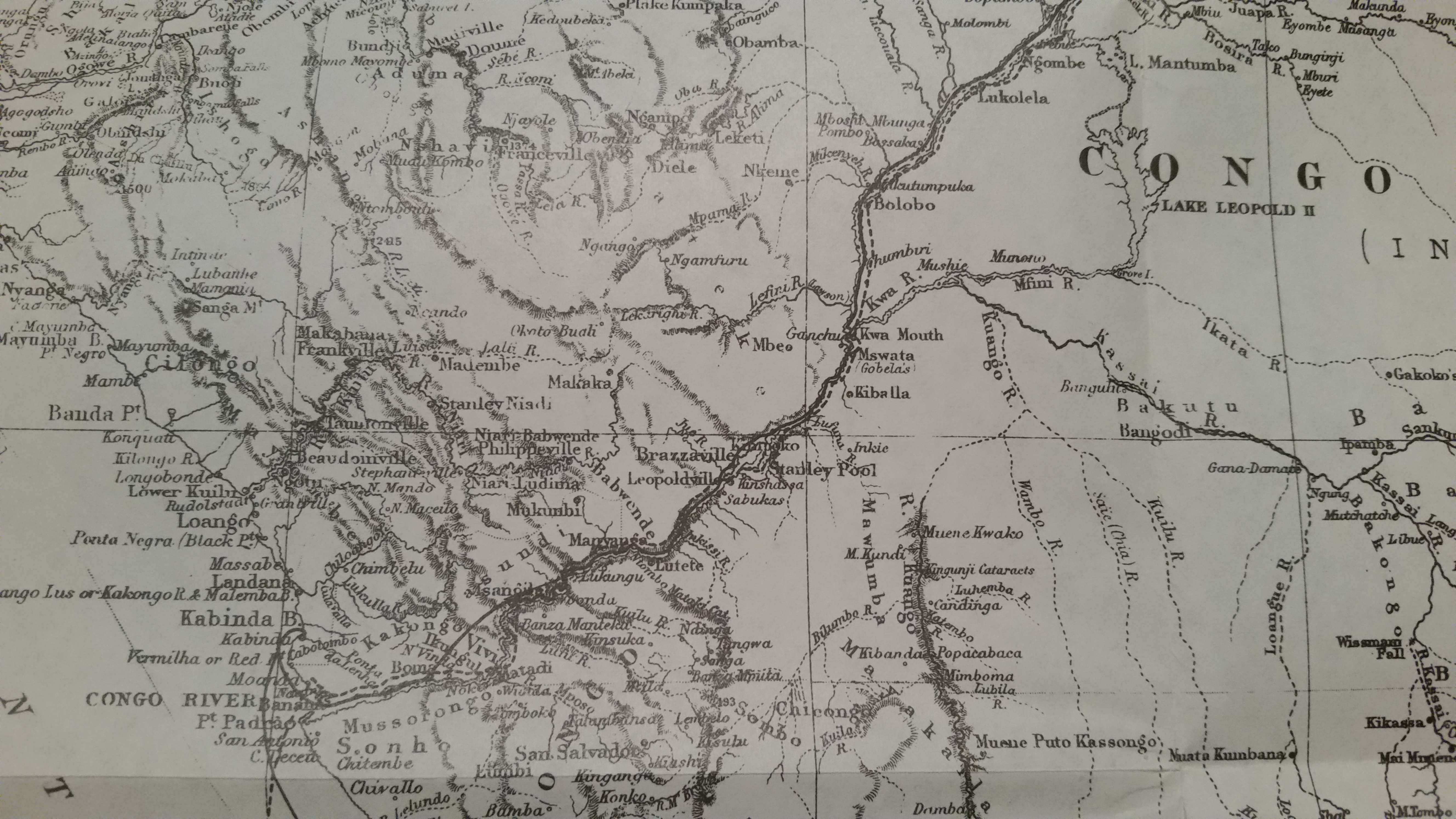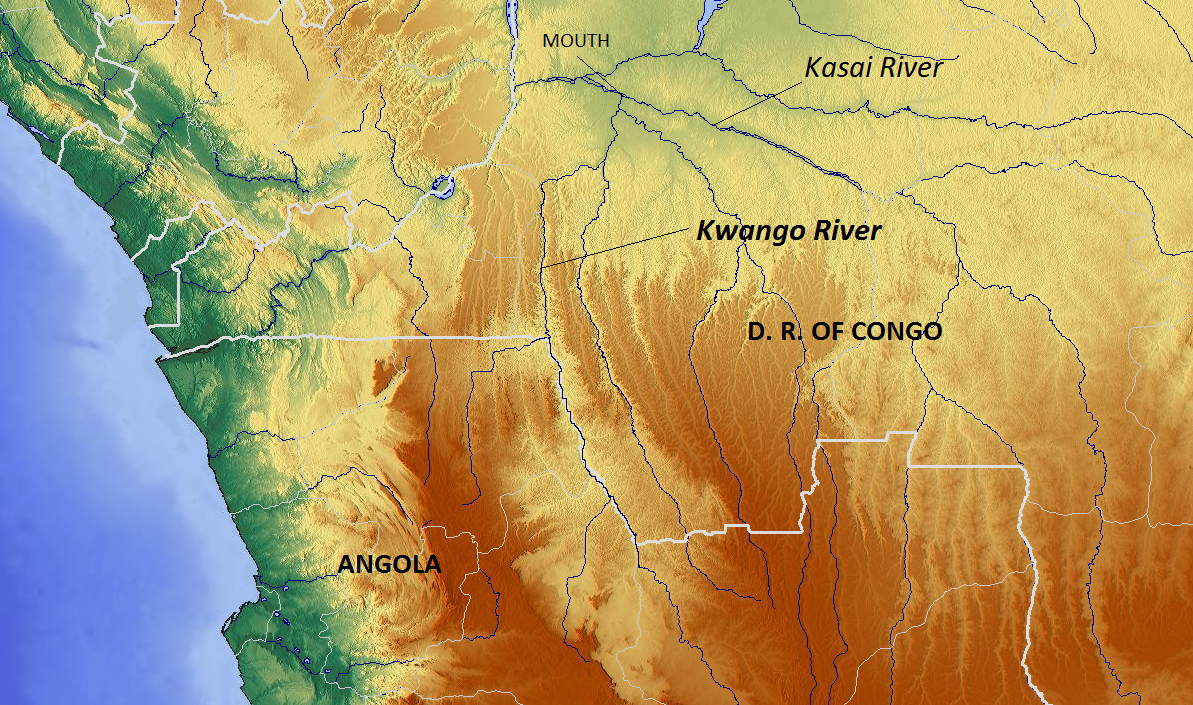|
Bagata Territory
Bagata Territory is an administrative region in the Kwilu Province of the Democratic Republic of the Congo. The headquarters are in the town of Bagata. The territory is divided into five sectors: Kidzweme, Kwango-Kasai, Kwilu-Ntobere, Manzasay and Wamba-Fatunda. The Kasai River flows along the northern boundary of the territory. The Kwilu River crosses the territory, flowing in a northwesterly direction past the town of Bagata towards the city of Bandundu, where it joins the Kwango River The Cuango or Kwango ( pt, Rio Cuango) is a transboundary river of Angola and Democratic Republic of Congo. It is the largest left bank tributary of the Kasai River in the Congo River basin. It flows through Malanje in Angola. The Kwango Riv ... shortly before that stream enters the Kasai. References Populated places in Kwilu Province Territories of the Democratic Republic of the Congo {{DRC-geo-stub ... [...More Info...] [...Related Items...] OR: [Wikipedia] [Google] [Baidu] |
Provinces Of The Democratic Republic Of The Congo
Article 2 of the Constitution of the Democratic Republic of the Congo divides the country into the capital city of Kinshasa and 25 named provinces. It also gives the capital the status of a province. Therefore, in many contexts Kinshasa is regarded as the 26th province. List History When Belgium annexed the Belgian Congo as a colony in November 1908, it was initially organised into 22 districts. Ten western districts were administered directly by the main colonial government, while the eastern part of the colony was administered under two vice-governments: eight northeastern districts formed Orientale Province, and four southeastern districts formed Katanga. In 1919, the colony was organised into four provinces: * Congo-Kasaï (five southwestern districts), * Équateur (five northwestern districts), * Orientale Province and Katanga (previous vice-governments). [...More Info...] [...Related Items...] OR: [Wikipedia] [Google] [Baidu] |
Kwilu Province
Kwilu is a province of the Democratic Republic of the Congo. It's one of the 21 provinces created in the 2015 repartitioning. Kwilu, Kwango, and Mai-Ndombe provinces are the result of the dismemberment of the former Bandundu province. Kwilu was formed from the Kwilu district and the independently administered cities of Bandundu and Kikwit. Bandundu is the provincial capital. The province takes its name from the Kwilu River, which crosses it from south to north. Administrative areas Towns and territories are: * Bagata * Bulungu * Gungu * Idiofa * Mangai * Masi-Manimba History Kwilu was administered as a province from 1962 to 1966, however in 1964 the administration was taken over by the central government due to a rebellion in southwestern Congo. A rebel administration under Pierre Mulele ran most of Kwilu province from January 1964.Stephen L. Weigert, Angola: A Modern Military History 1961-2002, 16-22. The province was reconquered by the legal government in June 1965 ... [...More Info...] [...Related Items...] OR: [Wikipedia] [Google] [Baidu] |
Kituba Language
Kituba ( mkw, Kituba, ktu, Kikongo ya leta) is a widely used lingua franca in Central Africa. It is a creole language based on Kikongo, a Bantu language. It is a national language in Republic of the Congo and Democratic Republic of the Congo. Names Kituba is known by many names among its speakers. In academic circles the language is called ''Kituba'' or ''Kikongo-Kituba''. In the Republic of the Congo it is called ''Munukutuba'' or ''Kituba''. The former (also spelled ''Monokutuba'') is a phrase which means literally "I say", and is used in the Republic's 1992 constitution. The latter means "way of speaking" and is used in the 2015 constitution. In the Democratic Republic of the Congo it is called ''Kikongo ya leta'' ("the state's Kikongo" or "Government Kikongo"), or Kikongo de L'état, shortened to ''Kileta''. Confusingly, it is also called ''Kikongo'', especially in areas that lack Kongo (Kikongo) speakers. The constitution of the Democratic Republic of the Congo lists "Ki ... [...More Info...] [...Related Items...] OR: [Wikipedia] [Google] [Baidu] |
Democratic Republic Of The Congo
The Democratic Republic of the Congo (french: République démocratique du Congo (RDC), colloquially "La RDC" ), informally Congo-Kinshasa, DR Congo, the DRC, the DROC, or the Congo, and formerly and also colloquially Zaire, is a country in Central Africa. It is bordered to the northwest by the Republic of the Congo, to the north by the Central African Republic, to the northeast by South Sudan, to the east by Uganda, Rwanda, and Burundi, and by Tanzania (across Lake Tanganyika), to the south and southeast by Zambia, to the southwest by Angola, and to the west by the South Atlantic Ocean and the Cabinda exclave of Angola. By area, it is the second-largest country in Africa and the 11th-largest in the world. With a population of around 108 million, the Democratic Republic of the Congo is the most populous officially Francophone country in the world. The national capital and largest city is Kinshasa, which is also the nation's economic center. Centered on the Cong ... [...More Info...] [...Related Items...] OR: [Wikipedia] [Google] [Baidu] |
Bagata, Bandundu
Bagata is a town in the Kwilu Province of the Democratic Republic of the Congo. It is the administrative headquarters of Bagata Territory, and is situated on the Kwilu River between Kikwit and Bandundu. Notable citizens Tabu Ley Rochereau Pascal-Emmanuel Sinamoyi Tabu (13 November 1940 – 30 November 2013), better known as Tabu Ley Rochereau, was a leading African rumba singer-songwriter from the Democratic Republic of the Congo. He was the leader of ''Orchestre Afrisa Internatio ..., a musician and later politician once dubbed the "African Elvis", was born in Bagata. References {{DRCongo-geo-stub Populated places in Kwilu Province ... [...More Info...] [...Related Items...] OR: [Wikipedia] [Google] [Baidu] |
Kasai River
The Kasai River ( ; called Cassai in Angola) is a tributary (left side) of the Congo River, located in Central Africa. The river begins in central Angola and flows to the east until it reaches the border between Angola and the Democratic Republic of the Congo, where it turns north and serves as the border until it flows into the DRC. From Ilebo, between the confluences with Lulua river and Sankuru river, the Kasai river turns to a westerly direction. The lower stretch of the river from the confluence with Fimi river, is known as the Kwa(h) River, before it joins the Congo at Kwamouth northeast of Kinshasa. The Kasai basin consists mainly of equatorial rainforest areas, which provide an agricultural land in a region noted for its infertile, sandy soil. It is a tributary of Congo river and diamonds are found in it. Around 60% of diamonds in Belgium go from Kasai river for cutting and shaping. Exploration Henry Morton Stanley reached the confluence on 9 March 1877, calling the rive ... [...More Info...] [...Related Items...] OR: [Wikipedia] [Google] [Baidu] |
Kwilu River
The Kwilu River is a major river in the Kwilu Province formerly known as Bandundu province in the Democratic Republic of the Congo (DRC) to the city of Bandundu, where it joins the Kwango River just before this stream enters the Kasai River. In the DRC the river flows past the towns of Gungu, Kikwit, Bulungu, Bagata, Rutherfordia and Bandundu. Lusanga, formerly Leverville, lies at the location where the Kwenge River joins the Kwilu, between Kikwit and Bulungu. Characteristics It is a meandering river. Near its mouth it is 950 meter wide. The bed material is sand Sand is a granular material composed of finely divided mineral particles. Sand has various compositions but is defined by its grain size. Sand grains are smaller than gravel and coarser than silt. Sand can also refer to a textural class o .... The river is about long. In the wet season the flooded area covers . The headwaters of the river rise at elevations between and in the Angolan highlands. They dro ... [...More Info...] [...Related Items...] OR: [Wikipedia] [Google] [Baidu] |
Bandundu (city)
Bandundu, formerly known as Banningville or Banningstad, is the capital city of Kwilu Province of the Democratic Republic of the Congo. Location Bandundu is located on the east bank of the Kwango River, just north of the juncture of the Kwango and the Kwilu, and south from the mouth of the Kwango on the Kasai River. It is around from Kinshasa by air, or about by road. In 2009, Bandundu had an estimated population of 133,080. Economy Bandundu was once a significant river port, as it is the largest town on the river between Kinshasa and Kikwit. However, traffic on the Kasai and Kwango Rivers dropped dramatically as a result of the Second Congo War, and has yet to recover. Bandundu does have intermittent passenger and freight service to Kinshasa, Mushie and Kikwit. Since 2008, there is a car/truck ferry service running several times per day across the Kwango. An unpaved road, roughly 250 km long, runs from this point to the main (paved) highway between Kinshasa and Ki ... [...More Info...] [...Related Items...] OR: [Wikipedia] [Google] [Baidu] |
Kwango River
The Cuango or Kwango ( pt, Rio Cuango) is a transboundary river of Angola and Democratic Republic of Congo. It is the largest left bank tributary of the Kasai River in the Congo River basin. It flows through Malanje in Angola. The Kwango River basin has large resources of diamonds in the Chitamba-Lulo Kimberlite Cluster in Lunda Norte Province, discovered in the main river channel and on flats and terraces in its flood plains. History The Rund Kingdom, which expanded to become the Lunda Empire, encompassed territory stretching from Kwango River to the Luapula River. Its rulers partook in the slave trade. Lunda's expansion in the valley promoted a common political and cultural heritage while also promoting slave trading, accounting for the low population densities between the Kwango and Kwilu rivers.Ogot, p.607 The Portuguese colonized the Kwango River valley and usurped the Kingdom of Kasanje. The Kwango River was subject to a Portuguese treaty signing in Lisbon on May 25, 1 ... [...More Info...] [...Related Items...] OR: [Wikipedia] [Google] [Baidu] |
Populated Places In Kwilu Province
Population typically refers to the number of people in a single area, whether it be a city or town, region, country, continent, or the world. Governments typically quantify the size of the resident population within their jurisdiction using a census, a process of collecting, analysing, compiling, and publishing data regarding a population. Perspectives of various disciplines Social sciences In sociology and population geography, population refers to a group of human beings with some predefined criterion in common, such as location, race, ethnicity, nationality, or religion. Demography is a social science which entails the statistical study of populations. Ecology In ecology, a population is a group of organisms of the same species who inhabit the same particular geographical area and are capable of interbreeding. The area of a sexual population is the area where inter-breeding is possible between any pair within the area and more probable than cross-breeding with ind ... [...More Info...] [...Related Items...] OR: [Wikipedia] [Google] [Baidu] |


